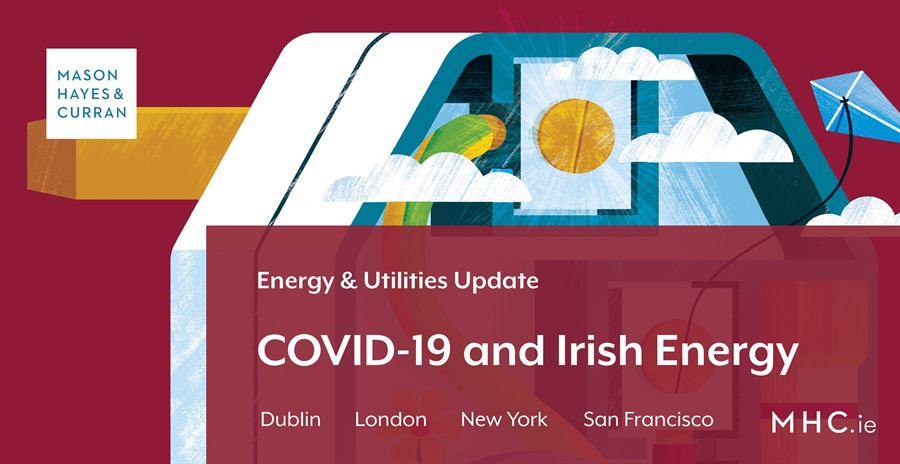
As a highly infectious respiratory disease, the effect of COVID-19 and the public health response has been felt most keenly in those sectors that are most exposed to the movement of humans.
The energy sector occupies a middle ground – the physical transformations that generate value are, under “business as usual” scenarios, largely carried out without direct human intervention. Human involvement is, of course, more concentrated in certain parts of the energy sector, such as construction and maintenance of generation assets, and the sales and service element of the supply function.
Government guidelines and regulations on essential services
The Irish Government published a list of “essential services” in late March that were afforded exemptions from the COVID-19 movement restrictions. Essential services include “services provided in the … areas [of:]
-
electric power generation, transmission and distribution
-
extraction and distribution of gas”
The essential services list was later put on a statutory footing from 8 April 2020 by the Health Act 1947 (Section 31A - Temporary Restrictions) (Covid-19) Regulations 2020.
As well as the above services, exceptions to the movement restrictions extend to the manufacture of products necessary for the related supply chain, as well as the supply, repair and installation of related machinery and equipment.
RESS 1 auction timetable
As market participants will be well aware, the Qualification Application Closing Date for the RESS 1 auctions for renewable electricity support was pushed back from 2 April 2020 to 30 April 2020 for reasons associated with COVID-19 and the frictions associated with remote working. All subsequent deadlines and milestones in the auction process were also moved, in lockstep. EirGrid published a revised RESS timetable on 24 April 2020. At the time of publication there is no indication that Covid-19 will have any further impact on the RESS 1 timeline.
Commission for Regulation of Utilities (CRU) and COVID-19
The CRU recently published its first set of responses to various technical queries received from Irish energy sector stakeholders on the impact of COVID-19. There does not seem to be a statutory basis for the CRU’s treatment of a set of queries in this manner.
Notable CRU responses included:
-
When assessing any generator unavailability, due consideration will be given by the CRU to the inability of equipment manufacturers to undertake necessary maintenance or outage work due to Covid-19 restrictions
-
When assessing any non-compliance with industry rules during the period of “public health guidance”, the CRU will give due consideration to the specific circumstances of the case
-
The CRU resisted pressure to grant a general waiver of network pass-through charges for all customers
 Supply Suspension Scheme
Supply Suspension Scheme
On 1 May 2020, the CRU published a second queries list and a Decision Paper on COVID-19 Supply Suspension Due to Temporary Closure. The scheme described in the decision paper involves a temporary administrative suspension of supply to certain SME electricity customers who have been classified as non-essential during the COVID-19 movement restrictions, and who have become non-operational as a result.
Successful applicants will have no energy or network charges billed for their business premises supply point for the duration of the restrictions. Fixed network charges for these customers and the relevant suppliers will be suspended, although the PSO levy will continue to apply. The scheme will run until 31 July 2020, subject to review.
The implementation of the scheme requires the cooperation of Irish electricity suppliers, and while this was stated by the CRU to be voluntary, it appears that all major suppliers are indeed cooperating.
Domestic customers
The CRU has also taken a number of actions to protect domestic consumers, including a moratorium on disconnections of domestic customers for non-payment until 16 June 2020. The emergency credit for gas prepayment meters also increased from €10 to €100, as gas credit cannot be purchased online.
Market effects
Independent Irish energy trading and services company ElectroRoute has calculated that for the first four weeks of Covid-19 movement restrictions, average Single Electricity Market prices were down by 32% (day-ahead market) and 46% (balancing market) relative to the equivalent period in 2019.
However, they note that these price reductions are not solely attributable to the demand reductions and shifts associated with COVID-19 – recent low oil and gas prices, combined with high levels of wind generation, have also contributed.
Further engagement
For the period of the COVID-19 “health emergency”, generators and suppliers can continue to submit queries of a technical and general nature to the CRU at: industryqueries@cru.ie. The CRU will publish updated queries lists on its website for the benefit of stakeholders as necessary.
Even though energy is not the most labour-intensive of Ireland’s productive sectors, it has certainly not escaped the effects of the virus. However, the physical delivery of electricity and natural gas has so far shown itself to be resilient under the pressure exerted by COVID-related restrictions across Irish society, and the operators of the respective networks are to be congratulated for that.
For more information on the continuing impact of COVID-19 on your business and/or contemplated projects, contact a member of our Energy & Utilities team.
The content of this article is provided for information purposes only and does not constitute legal or other advice.
Share this:




